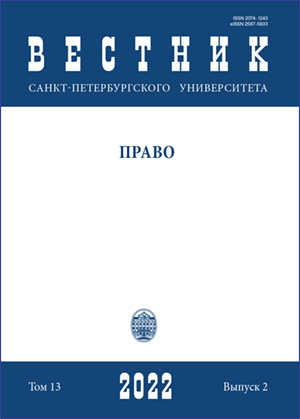Comparative legal analysis of the institution of conditionally early release from the punishment in the criminal legislation of Russia and foreign countries
DOI:
https://doi.org/10.21638/spbu14.2022.213Abstract
The article is devoted to the institution of parole from serving a sentence (hereinafter — parole) as an important incentive for law-abiding behavior of convicts in Russia and some foreign countries. A comparative legal analysis of the conditions for the use of this incentive institution in order to optimize the domestic criminal and penal legislation, taking into account foreign experience, is carried out. Reflected proposals to improve the efficiency of the parole mechanism in law enforcement practice. The authors reveal the grounds and conditions for the use of the incentive institute of parole in some countries of the Commonwealth of Independent States (hereinafter — the CIS), as well as in England, Germany, USA, Spain, Switzerland, etc. Particular attention is paid to the issue of parole in relation to those sentenced to life imprisonment freedom. Based on the study of the positive experience of developed foreign countries (England, Germany, Switzerland), it is proposed to change the parole mechanism in relation to life-sentenced prisoners in Russia and to provide for the possibility of transferring these persons with positively characterized behavior after serving at least 15 years of their sentence from the penal colony of the special regime in the penal colony with a strict regime, as well as to reduce the obligatory term of serving the sentence for the onset of parole in relation to those sentenced to life imprisonment from 25 to 20 years. In order to reduce recidivism among those on parole and reduce the number of those sentenced to punishments not related to isolation from society, it seems expedient, based on the experience of some CIS countries, to provide for the possibility of parole in relation to those sentenced to punishment in the form of correctional labor and restraint of freedom.
Keywords:
release on parole, deprivation of liberty, incentive institution, social adaptation, foreign experience, criminal inspection
Downloads
References
Downloads
Published
How to Cite
Issue
Section
License
Articles of "Vestnik of Saint Petersburg University. Law" are open access distributed under the terms of the License Agreement with Saint Petersburg State University, which permits to the authors unrestricted distribution and self-archiving free of charge.






